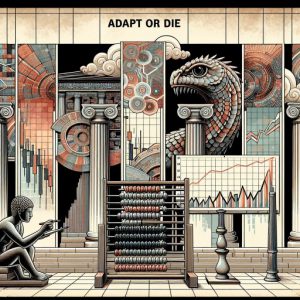
Navigating the Risks of AI: The Why is AI Bad Debate
Updated May, 2023
Artificial intelligence (AI) is rapidly evolving, with OpenAI’s latest release of the GPT-4 large language model being the most recent example. Its enhanced capabilities to process complex instructions and multimodal inputs make it a powerful tool for advancing research and innovation. However, why AI is bad arises when we consider the potential risks and harms arising from its use.
Isaac Asimov, a renowned science fiction author who delved into the interplay between technology and society, lamented, “The most melancholy thing about life today is that knowledge is being gathered at an incredible pace while wisdom lags behind.” Therefore, as we harness the possibilities of AI, we must also cultivate the sagacity to use it conscientiously and enduringly.
Unemployment: The Hierarchy of Labor
One of the biggest concerns surrounding Artificial Intelligence is its impact on employment. But why is AI bad for the job market? With advanced machines capable of replacing human workers, particularly in jobs requiring manual labour, many fear this trend will lead to widespread unemployment and intensify existing inequalities.
As Asimov once noted, “The only constant changes and change is often painful.” The shift in the labour hierarchy is just one example of the profound changes Artificial Intelligence will bring to our society. We must develop strategies to help individuals transition to new jobs and careers in the face of these changes while also considering the potential impact on our economy and society.
Inequality: The Distribution of Wealth
Another issue related to AI is its impact on income inequality. AI-driven companies can reduce their dependence on the human workforce, leading to the concentration of wealth among fewer individuals. This can exacerbate existing inequalities and create new ones. But why is AI bad for wealth distribution, and what can we do to address this issue?
Quoting Asimov, he once stated, “The genuine danger is the slow erosion of our liberties through the action of nibbling little by little, in a seemingly innocent way, and for expedience.” It is our responsibility to guarantee that AI’s advantages are distributed fairly and that wealth concentration does not compromise our democratic principles and values of justice. This requires a careful examination of AI’s potential impact on our economy and society and proactive measures to ensure that its benefits are shared equitably.
Humanity: The Impact on Behavior and Interaction
As AI technology advances, there is concern about its impact on human behaviour and interaction. AI bots are becoming increasingly skilled at modelling human conversation and relationships, raising questions about the authenticity of human interactions and the potential for unintended consequences. But why is AI bad for human interaction, and how can we ensure that AI remains a tool for human empowerment and not a threat to our fundamental values?
Isaac Asimov wisely stated, “Self-education is, I firmly believe, the only kind of education there is.” We must educate ourselves about the potential implications of AI and develop strategies to ensure that it does not undermine our fundamental human values of empathy, compassion, and respect. This requires a thoughtful approach to AI development, focusing on creating tools that enhance, rather than replace, human potential.
Why is AI bad
As we confront the complex and intricate AI predicament, it demands a nuanced and discerning approach. But replacing “The AI Dilemma” with “Why is AI bad” accurately notes the potential risks and harms associated with AI. Therefore, we must carefully evaluate AI’s possible benefits and drawbacks and establish guidelines and protocols that guarantee its judicious and sustainable usage.
The Center for Humane Technology aims to close the disconnect between what the public is informed about AI and the concerns shared by those working in Artificial intelligence labs. They are actively translating these concerns into a comprehensive narrative and presenting them to media outlets and institutions.
AI Overview: Navigating the Risks and Benefits of Artificial Intelligence
This Overview delves into the complex and evolving landscape of artificial intelligence. From OpenAI’s latest GPT-4 release to the potential risks and harms associated with AI’s use, we explore the impact of AI on employment, income inequality, and human behaviour.
Isaac Asimov’s wise words remind us that as we harness the possibilities of AI, we must also cultivate the sagacity to use it conscientiously and enduringly. We discuss strategies to help individuals transition to new jobs and careers in the face of AI-driven automation while ensuring that AI’s advantages are distributed fairly.
We also examine the potential impact of AI on human behaviour and interaction, focusing on creating tools that enhance, rather than replace, human potential.
As we confront the Artificial Intelligence dilemma, we must evaluate the benefits and drawbacks of AI and establish guidelines and protocols that guarantee its judicious and sustainable usage. The Center for Humane Technology aims to bridge the gap between the public and AI experts, sharing concerns and encouraging a thoughtful approach towards AI development.
Random reflections on AI: May 30 update
In the May 30th update, AMD, GOOGL, and NET traded within the suggested exit prices as we had advised. Moving forward, we plan to send two updates this month and provide more frequent short updates on the forum.
The hype around AI is rapidly intensifying, with many believing that a new bull market has begun. However, it is important to recognize that the Nasdaq and SP500 are fueled by less than 9 stocks. Despite the praise AI receives as the next saviour, there is a fundamental factor that those making these claims fail to understand. The masses only embrace a new concept when it adheres to the principle of KISS (keep it simple stupid). At present, AI bots do not align with this principle.
In simpler terms, people want an AI personal assistant that can easily understand them and operate seamlessly. However, existing chatbots often provide unintelligent responses, requiring users to repeatedly prompt them. If prompted correctly, these chatbots can occasionally deliver impressive answers, but therein lies the problem. Who wants to spend time learning how to communicate effectively with a prompt? It’s akin to going back in time, resembling the DOS prompt era.
A recent study revealed that only 20% of individuals actively utilize these models, and even among them, it is likely that less than 5% truly understand how to make the most of them. Hence, the significant investments made by large companies in a product that is inherently flawed is nothing short of foolishness. The flaw lies in one simple reason: AI is not yet intelligent enough to account for human fallibility. In other words, it struggles to effectively engage with individuals not well-versed in complex technologies. Until these changes, the general public will not fully embrace AI.
FAQs
Why is AI bad?
What is the biggest concern surrounding Artificial Intelligence?
One of the biggest concerns surrounding AI is its impact on employment. With advanced machines capable of replacing human workers, particularly in jobs requiring manual labour, many fear this trend will lead to widespread unemployment and intensify existing inequalities.
What is another issue related to AI?
Another issue related to AI is its impact on income inequality. AI-driven companies can reduce their dependence on the human workforce, leading to the concentration of wealth among fewer individuals. This can exacerbate existing inequalities and create new ones.
What is the concern about AI’s impact on human behaviour and interaction?
As AI technology advances, there is concern about its impact on human behaviour and interaction. AI bots are becoming increasingly skilled at modelling human conversation and relationships, raising questions about the authenticity of human interactions and the potential for unintended consequences.
What are some potential risks and harms associated with AI’s use?
The potential risks and harms associated with AI’s use include unemployment, income inequality, and the impact on human behavior and interaction.
Why is Artificial Intelligence good?
What are some potential benefits of AI?
Potential benefits of AI include its enhanced capabilities to process complex instructions and multimodal inputs, making it a powerful tool for advancing research and innovation.
What is the responsibility of society in ensuring AI’s benefits are distributed fairly?
It is our responsibility to guarantee that AI’s advantages are distributed fairly and that wealth concentration does not compromise our democratic principles and values of justice. This requires a careful examination of AI’s potential impact on our economy and society and proactive measures to ensure that its benefits are shared equitably.
What is the focus of creating Artificial Intelligence tools?
The focus of creating AI tools should be on enhancing, rather than replacing, human potential. This requires a thoughtful approach to AI development, with a focus on creating tools that enhance, rather than replace, human potential.
What is the Center for Humane Technology’s goal?
The Center for Humane Technology aims to bridge the gap between the public and AI experts, sharing concerns and encouraging a thoughtful approach towards AI development.
What is the importance of evaluating the benefits and drawbacks of Artificial Intelligence?
As we confront the AI dilemma, we must evaluate the benefits and drawbacks of AI and establish guidelines and protocols that guarantee its judicious and sustainable usage.
Beyond the Ordinary: Fascinating Articles That Stand Out

Stock market basics for beginners: Adapt or Die

Richard Russell’s Dow Theory: Is It Still Valid?

DJU Index: To Buy or Flee? Unraveling the Market Mystery

Stock Market Psychology 101: Learn, Thrive, and Profit

In 1929 the Stock Market Crashed Because of Greed

Unshackling Minds: The Journey to Remove Brainwashing

Mob Psychology: Breaking Free to Secure Financial Success

Unveiling the VIX Fear Indicator: A Case Study in Market Volatility

Mind Games: Unmasking Brainwashing Techniques in Institutions & Media

The Gamblers Mindset: The Enigmatic Urge to Embrace Loss

Mass Psychology Mastery: Unleashing Financial Success Secrets

Brain Control: Domination via Pleasure

Yipee Yeah Yipey Yoh: Is Now a Good Time To Buy Bonds

The Perils of Following the Flock: Understanding Sheep Mentality

Psychology of Investing: Escape the Herd, Avoid Financial Destruction


